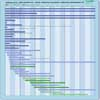Ion Density, Drift Velocity, And Temperature
Measurement Instruments
Measurement Definition: An instrument that measures the amount of ions encountered by the spacecraft, and attempts to deflect them to assess their velocity and temperature.
| Instrument | Status/
Accuracy | Instrument Description | Measurement Technology | Timeline |
| CER | Operational | Radio transmission from e-POP to ground for radio propagation and ionospheric scintillation measurements. | n/a |  |
| EFI | Operational | Thermal ion imager and Langmuir probe to measure ion temp, electron temp, ion density, electron density, spacecraft potential and ion incident angle. | n/a |  |
| IRM | Operational | Measures the composition and 3-dimensional velocity distributions of ions. | n/a |  |
| IVM | Operational | Measures the in-situ plasma density, ion temperature and composition, and drift velocity. Used for modeling the ionosphere to determine electric fields that could impact other systems (e.g. GPS radio signals). | n/a |  |
| SEMP | Operational | A suite that contains energetic particle detectors, magnetometer, and space weather impact detectors, among which, the energetic particle detectors measure high energy protons and high energy electrons with two probes. Particle flux detection is performed in multiple directions with a number of probes mounted toward different orientation on the three-axis stabilized spacecraft. The space weather impact detectors measure radiation dosage, electrification at the surface and deep inside the spacecraft. It’s the first time China put space weather impact and space environment detectors on the same geostationary platform. | n/a |  |
| SSI/ES-3 | Operational | Measurement of the ambient electron density and temperatures, the ambient ion density, and ion temperature and molecular weight. | n/a |  |
| ENAI | Being developed | The Energetic Neutral Atom Imager (ENAI) is used for imaging observations of neutral atoms (H, O) with energies ranging from 10 to 500 keV in the source region of magnetic storms, achieving high temporal, spatial, and energy resolutions. | n/a |  |
| SEM (FY-2) | No longer operational | Measures space environment parameters to support space craft operations. | n/a |  |